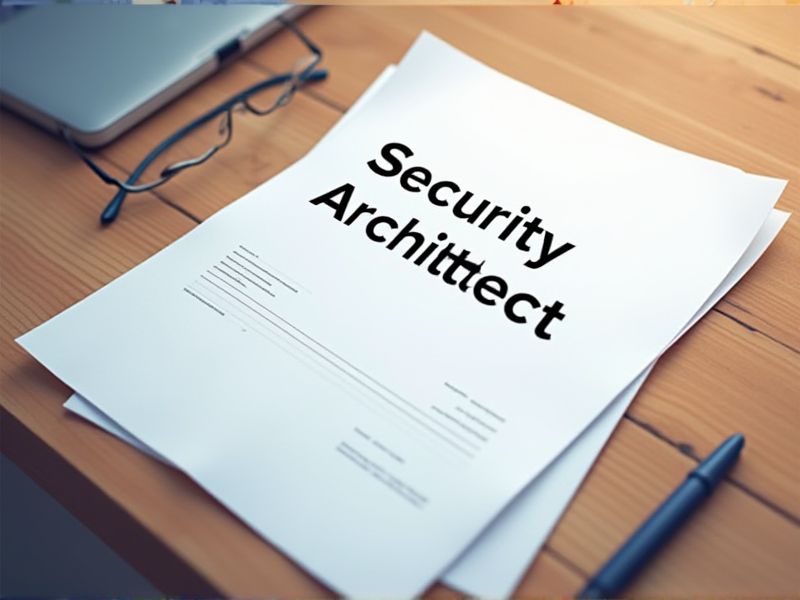
Security Architects play a crucial role in safeguarding an organization's information systems, requiring a deep understanding of various security protocols and technologies. Certifications validate a professional's expertise and keep them updated with the latest security threats and solutions. Many employers view these certifications as evidence of a candidate's dedication and competency within the evolving field of cybersecurity. Key certifications beneficial for a Security Architect include the following.
CISSP
CISSP certification provides a comprehensive understanding of advanced security protocols and frameworks necessary for a Security Architect's role. This credential is often required by employers as it validates a professional's ability to design and manage a secure IT environment effectively. Consistently updated with current security practices, CISSP equips architects with the skills to anticipate and mitigate potential cybersecurity threats. Industry recognition of CISSP underscores the credibility and competence of a Security Architect at deploying robust, scalable security architectures.
CISM
CISM provides a framework for aligning security architecture with organizational goals, ensuring that design meets strategic business objectives. It delivers expertise in risk management, enabling the identification and mitigation of threats that could compromise architectural integrity. Security architects benefit from CISM principles by enhancing their capability in governance, improving the overall resilience of information systems. CISM certification signals a robust understanding of policy development, vital for the creation and implementation of effective security architecture.
CEH
The CEH certification equips Security Architects with the skills to identify vulnerabilities by understanding hacker techniques. Mastering these tactics enables better network defense design, directly impacting the security architecture's robustness. A comprehensive knowledge of potential threats informs the strategic implementation of preventive measures. Understanding the hacker mindset builds a proactive stance in safeguarding organizational assets.
CCSP
The Certified Cloud Security Professional (CCSP) certification equips Security Architects with comprehensive knowledge in cloud security, enhancing their ability to design and manage secure cloud infrastructures. As organizations increasingly migrate to cloud environments, the risk of data breaches grows, necessitating expertise in mitigating these threats, which CCSP provides. CCSP credentials demonstrate an individual's commitment to maintaining updated knowledge of cloud security best practices and standards, fostering trust with employers and clients. This certification enables Security Architects to better align security strategies with business goals, ensuring robust protection for critical assets.
CompTIA Security+
Organizations require professionals who understand foundational cybersecurity principles; CompTIA Security+ equips Security Architects with essential knowledge. The certification covers a wide range of security topics, enabling architects to design robust security solutions. It serves as a benchmark, ensuring that architects possess the necessary skills to identify and mitigate risks. Employers often consider the certification as a standard requirement, highlighting its importance in validating security expertise.
CompTIA CySA+
CompTIA CySA+ emphasizes proactive defense strategies, which aligns with a security architect's need to design systems resilient to threats. Cybersecurity threats continue to evolve, demanding architects understand current adversary tactics, techniques, and procedures, all covered in CySA+. Threat detection and response skills, a focus of CySA+, are crucial for architects in safeguarding organizational infrastructure. Regulatory compliance knowledge gained through CySA+ assists security architects in aligning system designs with industry standards and legal requirements.
CompTIA CASP+
CompTIA CASP+ provides advanced knowledge crucial for developing robust security architectures. The certification emphasizes hands-on skills, which are essential for identifying and mitigating contemporary cyber threats. Security Architects benefit from its focus on enterprise security operations and architecture, ensuring comprehensive protection strategies. Employers often seek certified professionals to guarantee competence in managing complex security infrastructures.
GIAC Security Essentials (GSEC)
Gaining the GIAC Security Essentials (GSEC) certification equips a Security Architect with validated foundational knowledge in cybersecurity principles and practices. Organizations require experts who can design robust security frameworks, and the GSEC ensures a professional's understanding of core security concepts. Cybersecurity threats are ever-evolving, necessitating architects to grasp current threat landscapes and mitigation tactics, which GSEC emphasizes. GSEC certification serves as a testament to a Security Architect's capability in handling real-world security challenges effectively.
AWS Certified Security - Specialty
The AWS Certified Security - Specialty certification is critical for a Security Architect because it validates their skills in safeguarding sensitive data within cloud environments, an essential task given the prevalence of data breaches. As organizations increasingly migrate services to AWS, this certification ensures that a Security Architect is well-versed in AWS's security features, which is crucial to building secure architectures. This credential enhances a Security Architect's ability to identify and mitigate security vulnerabilities specific to AWS infrastructure. In a competitive job market, having this certification distinguishes a professional by demonstrating a focused commitment to cloud security best practices and industry standards.
CISA
The increasing complexity of IT infrastructures requires a Security Architect to have deep insights into auditing processes, which CISA certification provides. Without understanding security controls and compliance, a Security Architect may struggle to design systems that align with best practices and regulations. Lack of expertise in audit and assurance can lead to vulnerabilities in security systems, which CISA-trained professionals are equipped to identify and mitigate. Employers seek CISA-certified individuals for their capability to design robust security architectures that withstand audits and ensure data protection.
Summary
By achieving certifications, you'll likely increase your understanding of security frameworks and best practices. Certifications can differentiate you professionally, potentially leading to more job opportunities and higher salary offers. Your ability to design robust security systems may improve, aligning with industry standards. Ultimately, gaining certifications might enhance your credibility and trustworthiness within the cybersecurity community.
